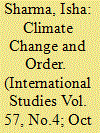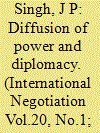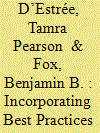| Srl | Item |
| 1 |
ID:
175355


|
|
|
|
|
| Summary/Abstract |
As globalization gained currency in international politics, multilateral negotiations increasingly expanded their scope to include environmental issues. Still, the political dimension of environmental change remains underrepresented in international relations (IR) theorization. This article aims to focus on the theoretical fortification in the mainstream IR when it comes to transboundary environmental threats. Since the threats of climate change and environmental degradation cannot be contained within the sovereign territories of states, the state-centric conception of the political order in the conventional approaches to IR fails to respond to the threats that are planetary in nature. The article seeks to answer two questions: (a) What are the inadequacies in the realist and liberal concepts of political order vis-à-vis climate change? (b) How to destabilize the conventional assumptions of political order with the aim of making it more receptive to the concerns associated with climate change? To do the latter, the article delves into the work of Robert Cox in order to delineate his intersubjective approach, which combines the material basis of political order with social relations of production. By doing so, this approach also sheds light on the transnational variants of hegemonic power, making it a useful explanatory framework for political implications of climate change.
|
|
|
|
|
|
|
|
|
|
|
|
|
|
|
|
| 2 |
ID:
137641


|
|
|
|
|
| Summary/Abstract |
The classic hierarchical distribution of power featuring nation-states is now increasingly supplemented with a diffusion of power with multiple actors. A hierarchical concentration of power is predicated toward bargaining coercion and great powers can impose their solutions on the weak. Diffused power allows for joint problem solving among multiple actors through negotiations but also makes reaching agreement hard because of the relatively greater equality among bargaining units. Reaching agreement in a diffusion of power is also hard because of the new perspectives and meanings that arise through globalized interactions. These new meanings – for example, commerce viewed through the lens of intra-firm rather than inter-country trade – make it hard to fashion solutions based on past understandings centered on territoriality and nation-states
|
|
|
|
|
|
|
|
|
|
|
|
|
|
|
|
| 3 |
ID:
176502


|
|
|
|
|
| Summary/Abstract |
Track Two processes were developed to facilitate movement in difficult international conflicts. Since Montville first coined the term, Track Two processes have considered deliberate and strategic ways to bring together adversaries in unofficial, private face-to-face interactions that allow for joint analysis and mutual learning. Such processes create the conditions for more nuanced problem definition and solution exploration. Ideally, these insights are then transferred into official peace processes, policymaking and decision-making. Transfer acknowledges a strategic dimension to planning for change; Track Two approaches abridge and accelerate the long-term accumulation approach by the strategic choice of participants, agenda and goals. This article reviews and summarizes our knowledge to date about how best to encourage Track Two inputs into negotiation and other Track One diplomatic efforts. It then offers a checklist for designing initiatives to best promote both intergroup learning and timely transfer to generate effective change.
|
|
|
|
|
|
|
|
|
|
|
|
|
|
|
|